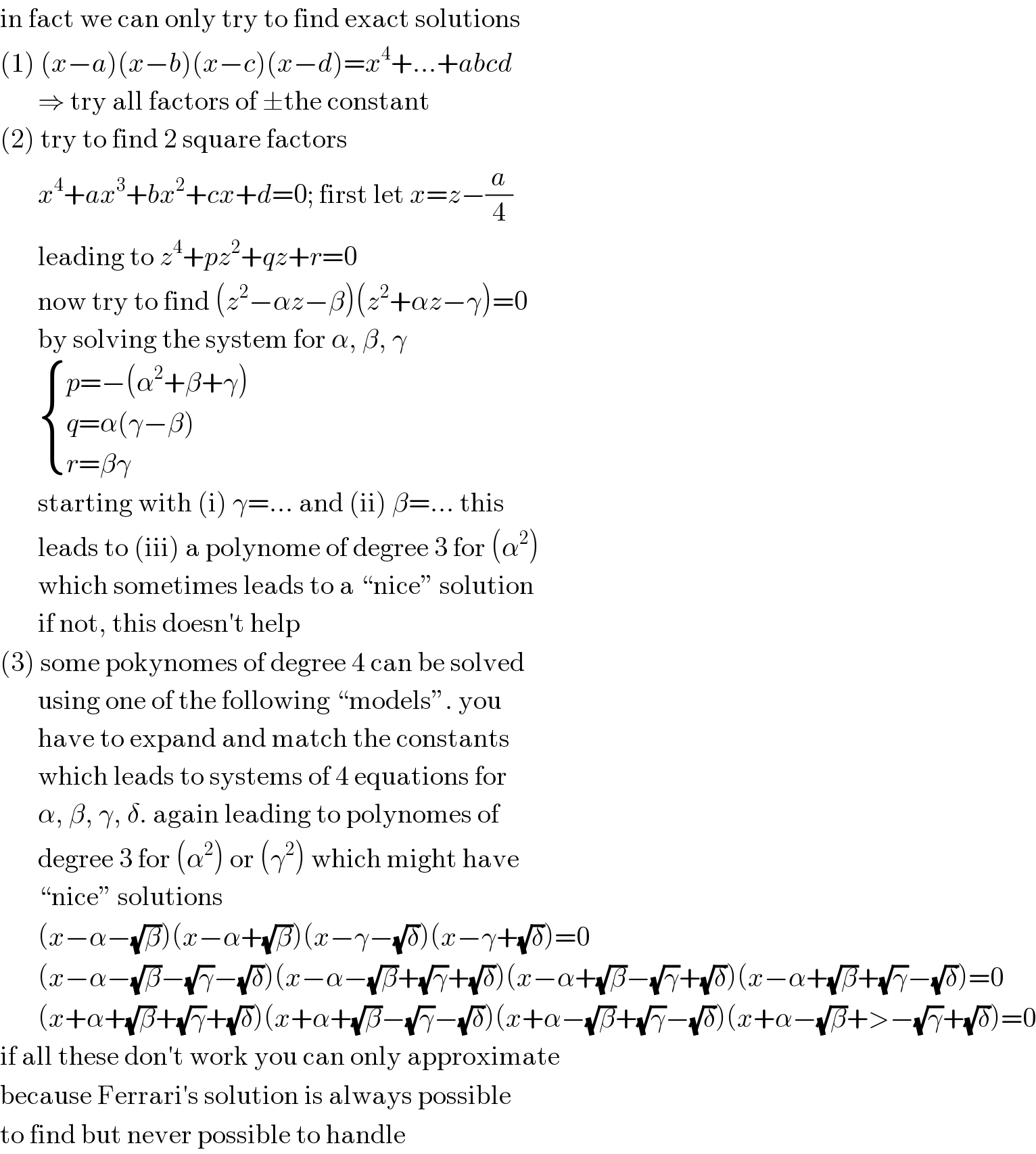
Question Number 77035 by necxxx last updated on 02/Jan/20

$${Solve}\:{for}\:{x}\:{in}: \\ $$$$\left({i}\right)\:\left(\mathrm{2}\left({x}+\mathrm{3}\right)−\mathrm{3}\left({x}−\mathrm{2}\right)\right)\left(\mathrm{2}{x}−\mathrm{1}\right)\geqslant\mathrm{0} \\ $$$$\left({ii}\right)\left({x}−\mathrm{1}\right)\left(\mathrm{2}{x}+\mathrm{3}\right)\left({x}+\mathrm{1}\right)\left({x}+\mathrm{3}\right)\leqslant\mathrm{1} \\ $$
Answered by MJS last updated on 03/Jan/20

$$\left({i}\right) \\ $$$$−\mathrm{2}{x}^{\mathrm{2}} +\mathrm{25}{x}−\mathrm{12}\geqslant\mathrm{0} \\ $$$$−\mathrm{2}\left({x}−\mathrm{12}\right)\left({x}−\frac{\mathrm{1}}{\mathrm{2}}\right)\geqslant\mathrm{0} \\ $$$$\left({x}−\mathrm{12}\right)\left({x}−\frac{\mathrm{1}}{\mathrm{2}}\right)\leqslant\mathrm{0}\:\Rightarrow\:\frac{\mathrm{1}}{\mathrm{2}}\leqslant{x}\leqslant\mathrm{12} \\ $$$$\left({ii}\right) \\ $$$$\mathrm{2}{x}^{\mathrm{4}} +\mathrm{9}{x}^{\mathrm{3}} +\mathrm{7}{x}^{\mathrm{2}} +\mathrm{9}{x}−\mathrm{10}\leqslant\mathrm{0} \\ $$$$\mathrm{zeros}\:\mathrm{at}\:{x}\approx−\mathrm{3}.\mathrm{03943}\wedge{x}\approx\mathrm{1}.\mathrm{02431} \\ $$$$\Rightarrow\:\approx−\mathrm{3}.\mathrm{03943}\leqslant{x}\leqslant\approx\mathrm{1}.\mathrm{02431} \\ $$
Commented by necxxx last updated on 03/Jan/20

$${Thank}\:{you}\:{so}\:{much}\:{MJS}\:.{However}\:{one} \\ $$$${of}\:{the}\:{major}\:{places}\:{I}\:{had}\:{issue}\:{in}\:{was} \\ $$$${in}\:{solving}\:{question}\:\left({ii}\right).\:{Is}\:{there}\:{a}\:{way}\:{to}\: \\ $$$${solve}\:{such}\:{quartic}\:{equations}?\:{Please}\:{help} \\ $$$${me}\:{out}\:{with}\:{that}.\:{Thank}\:{you}\:{so}\:{much}\:{sir}. \\ $$
Commented by MJS last updated on 03/Jan/20

$$\mathrm{in}\:\mathrm{fact}\:\mathrm{we}\:\mathrm{can}\:\mathrm{only}\:\mathrm{try}\:\mathrm{to}\:\mathrm{find}\:\mathrm{exact}\:\mathrm{solutions} \\ $$$$\left(\mathrm{1}\right)\:\left({x}−{a}\right)\left({x}−{b}\right)\left({x}−{c}\right)\left({x}−{d}\right)={x}^{\mathrm{4}} +...+{abcd} \\ $$$$\:\:\:\:\:\:\:\Rightarrow\:\mathrm{try}\:\mathrm{all}\:\mathrm{factors}\:\mathrm{of}\:\pm\mathrm{the}\:\mathrm{constant} \\ $$$$\left(\mathrm{2}\right)\:\mathrm{try}\:\mathrm{to}\:\mathrm{find}\:\mathrm{2}\:\mathrm{square}\:\mathrm{factors} \\ $$$$\:\:\:\:\:\:\:{x}^{\mathrm{4}} +{ax}^{\mathrm{3}} +{bx}^{\mathrm{2}} +{cx}+{d}=\mathrm{0};\:\mathrm{first}\:\mathrm{let}\:{x}={z}−\frac{{a}}{\mathrm{4}} \\ $$$$\:\:\:\:\:\:\:\mathrm{leading}\:\mathrm{to}\:{z}^{\mathrm{4}} +{pz}^{\mathrm{2}} +{qz}+{r}=\mathrm{0} \\ $$$$\:\:\:\:\:\:\:\mathrm{now}\:\mathrm{try}\:\mathrm{to}\:\mathrm{find}\:\left({z}^{\mathrm{2}} −\alpha{z}−\beta\right)\left({z}^{\mathrm{2}} +\alpha{z}−\gamma\right)=\mathrm{0} \\ $$$$\:\:\:\:\:\:\:\mathrm{by}\:\mathrm{solving}\:\mathrm{the}\:\mathrm{system}\:\mathrm{for}\:\alpha,\:\beta,\:\gamma \\ $$$$\:\:\:\:\:\:\:\begin{cases}{{p}=−\left(\alpha^{\mathrm{2}} +\beta+\gamma\right)}\\{{q}=\alpha\left(\gamma−\beta\right)}\\{{r}=\beta\gamma}\end{cases} \\ $$$$\:\:\:\:\:\:\:\mathrm{starting}\:\mathrm{with}\:\left(\mathrm{i}\right)\:\gamma=...\:\mathrm{and}\:\left(\mathrm{ii}\right)\:\beta=...\:\mathrm{this} \\ $$$$\:\:\:\:\:\:\:\mathrm{leads}\:\mathrm{to}\:\left(\mathrm{iii}\right)\:\mathrm{a}\:\mathrm{polynome}\:\mathrm{of}\:\mathrm{degree}\:\mathrm{3}\:\mathrm{for}\:\left(\alpha^{\mathrm{2}} \right) \\ $$$$\:\:\:\:\:\:\:\mathrm{which}\:\mathrm{sometimes}\:\mathrm{leads}\:\mathrm{to}\:\mathrm{a}\:``\mathrm{nice}''\:\mathrm{solution} \\ $$$$\:\:\:\:\:\:\:\mathrm{if}\:\mathrm{not},\:\mathrm{this}\:\mathrm{doesn}'\mathrm{t}\:\mathrm{help} \\ $$$$\left(\mathrm{3}\right)\:\mathrm{some}\:\mathrm{pokynomes}\:\mathrm{of}\:\mathrm{degree}\:\mathrm{4}\:\mathrm{can}\:\mathrm{be}\:\mathrm{solved} \\ $$$$\:\:\:\:\:\:\:\mathrm{using}\:\mathrm{one}\:\mathrm{of}\:\mathrm{the}\:\mathrm{following}\:``\mathrm{models}''.\:\mathrm{you} \\ $$$$\:\:\:\:\:\:\:\mathrm{have}\:\mathrm{to}\:\mathrm{expand}\:\mathrm{and}\:\mathrm{match}\:\mathrm{the}\:\mathrm{constants} \\ $$$$\:\:\:\:\:\:\:\mathrm{which}\:\mathrm{leads}\:\mathrm{to}\:\mathrm{systems}\:\mathrm{of}\:\mathrm{4}\:\mathrm{equations}\:\mathrm{for} \\ $$$$\:\:\:\:\:\:\:\alpha,\:\beta,\:\gamma,\:\delta.\:\mathrm{again}\:\mathrm{leading}\:\mathrm{to}\:\mathrm{polynomes}\:\mathrm{of} \\ $$$$\:\:\:\:\:\:\:\mathrm{degree}\:\mathrm{3}\:\mathrm{for}\:\left(\alpha^{\mathrm{2}} \right)\:\mathrm{or}\:\left(\gamma^{\mathrm{2}} \right)\:\mathrm{which}\:\mathrm{might}\:\mathrm{have} \\ $$$$\:\:\:\:\:\:\:``\mathrm{nice}''\:\mathrm{solutions} \\ $$$$\:\:\:\:\:\:\:\left({x}−\alpha−\sqrt{\beta}\right)\left({x}−\alpha+\sqrt{\beta}\right)\left({x}−\gamma−\sqrt{\delta}\right)\left({x}−\gamma+\sqrt{\delta}\right)=\mathrm{0} \\ $$$$\:\:\:\:\:\:\:\left({x}−\alpha−\sqrt{\beta}−\sqrt{\gamma}−\sqrt{\delta}\right)\left({x}−\alpha−\sqrt{\beta}+\sqrt{\gamma}+\sqrt{\delta}\right)\left({x}−\alpha+\sqrt{\beta}−\sqrt{\gamma}+\sqrt{\delta}\right)\left({x}−\alpha+\sqrt{\beta}+\sqrt{\gamma}−\sqrt{\delta}\right)=\mathrm{0} \\ $$$$\:\:\:\:\:\:\:\left({x}+\alpha+\sqrt{\beta}+\sqrt{\gamma}+\sqrt{\delta}\right)\left({x}+\alpha+\sqrt{\beta}−\sqrt{\gamma}−\sqrt{\delta}\right)\left({x}+\alpha−\sqrt{\beta}+\sqrt{\gamma}−\sqrt{\delta}\right)\left({x}+\alpha−\sqrt{\beta}+>−\sqrt{\gamma}+\sqrt{\delta}\right)=\mathrm{0} \\ $$$$\mathrm{if}\:\mathrm{all}\:\mathrm{these}\:\mathrm{don}'\mathrm{t}\:\mathrm{work}\:\mathrm{you}\:\mathrm{can}\:\mathrm{only}\:\mathrm{approximate} \\ $$$$\mathrm{because}\:\mathrm{Ferrari}'\mathrm{s}\:\mathrm{solution}\:\mathrm{is}\:\mathrm{always}\:\mathrm{possible} \\ $$$$\mathrm{to}\:\mathrm{find}\:\mathrm{but}\:\mathrm{never}\:\mathrm{possible}\:\mathrm{to}\:\mathrm{handle} \\ $$
